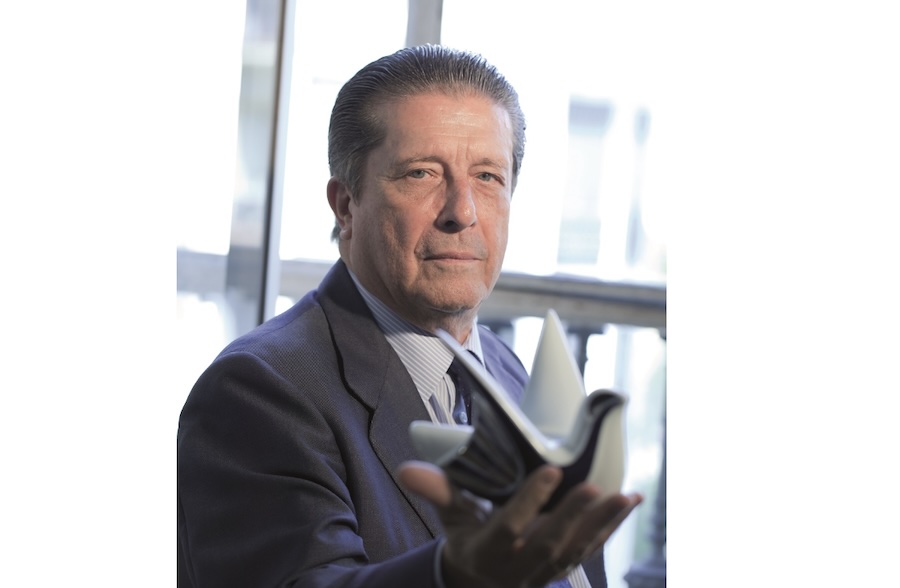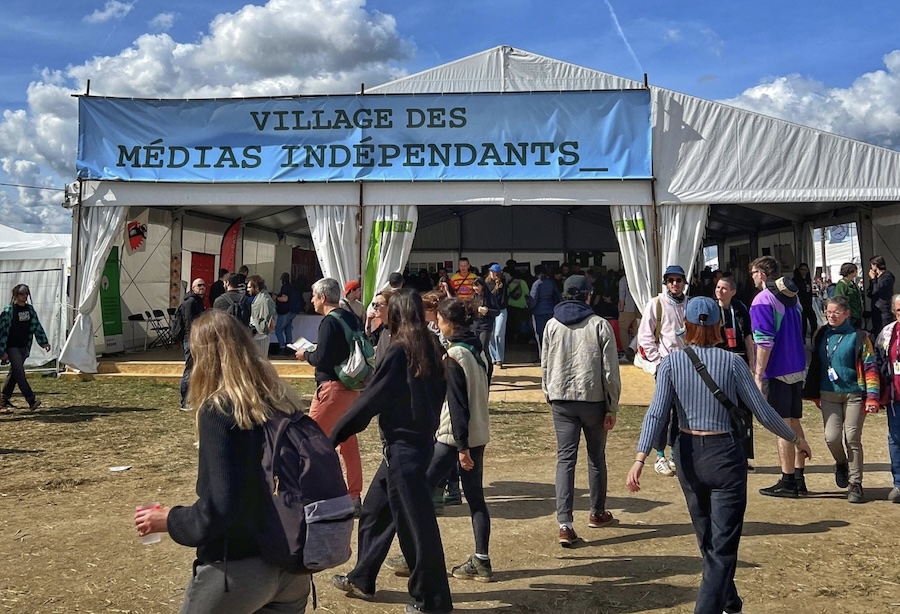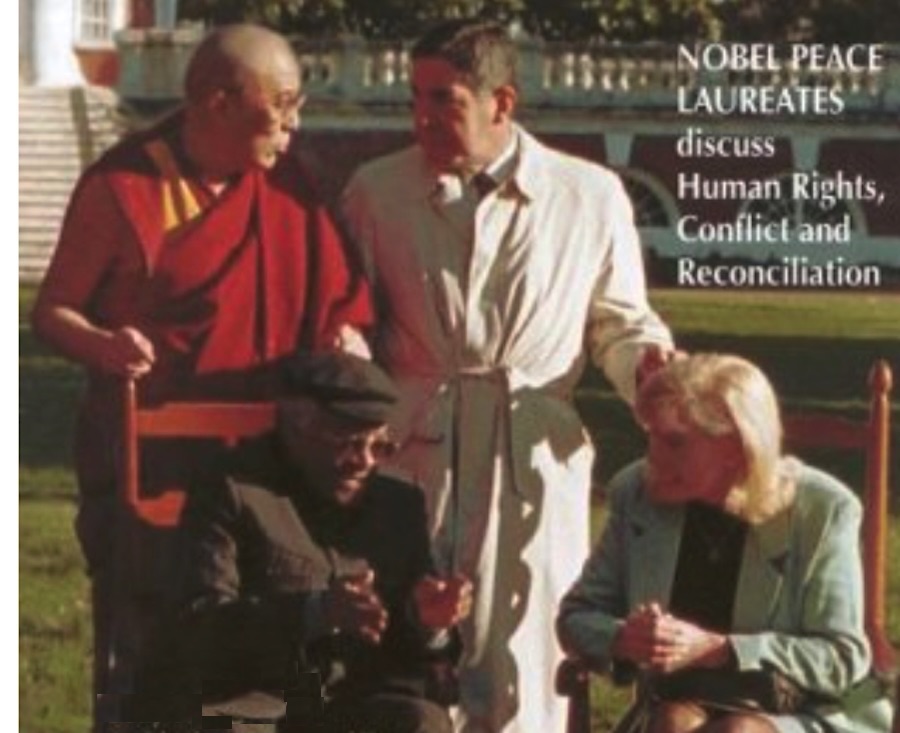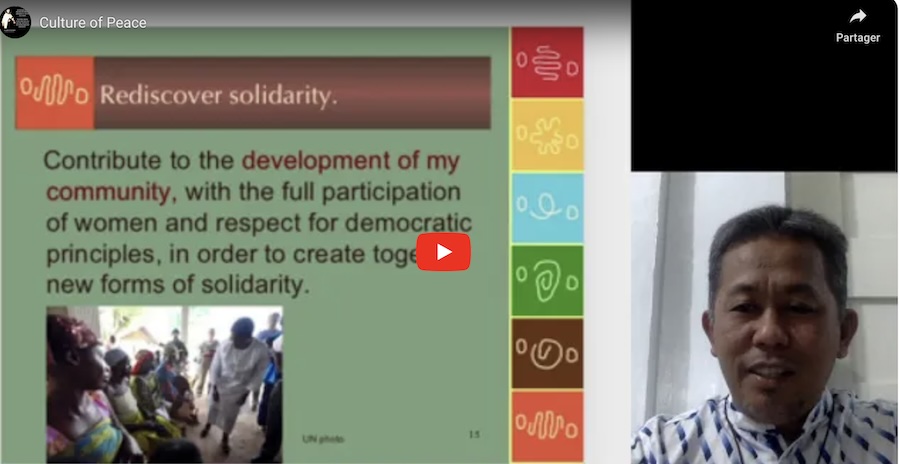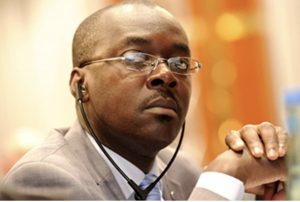FREE FLOW OF INFORMATION .
.
A survey by CPNN
The following 43 actions in 26 African countries include those listed in Google during the weeks of September 16-28 this year under the key words “International day of peace” and “Journée internationale de la paix.” The events also include some listed on the facebook page for the International Cities of Peace and the website of Campaign Nonviolence.
For events in North Africa see the page of actions in the Arab States .
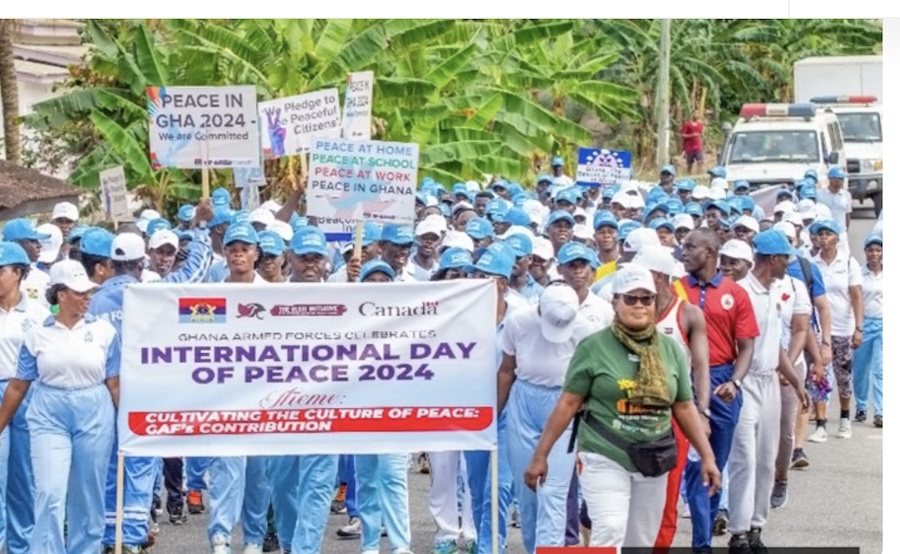
Ghana, Tokoradi
Here are excerpts from the articles.
On the International Day of Peace, Deutsch Welle asked young men and women in countries across Africa — from Ethiopia to Nigeria, Congo, Mozambique and Sudan — about what peace means to them.
Statement by H.E. Bankole Adeoye, Commissioner for Political Affairs, Peace and Security on the Occasion of the Commemoration of the 2024 International Day of Peace, 21 September 2024. Today, as we commemorate the International Day of Peace, the African Union (AU) reaffirms its commitment to advancing peace, security and stability in Africa. Particularly so when this year’s event is also being celebrated against the drop of intractable terrorism, insurgency and armed conflicts where in some cases, the concept of protection of civilians is collapsing and genocide is either real or looming, driven by injustice, intolerance, exclusion, poverty, inequality, constitutional governance and climate change challenges. And these serve as grave threats to Africa and indeed global, stability, peace and prosperity.
This year’s Peace Day theme, “Cultivating a Culture of Peace”, is therefore a timely reminder for the AU and its regional economic communities and mechanisms (RECs/RMs), civil society and the private sector as well as our bilateral and multilateral partners, to scale up our individual and collective efforts in holistic peacebuilding approaches. It calls for cross-sectoral responses to the conflict and post-conflict situations in the Horn of Africa, the Lake Chad Basin, the Sahel and the Great Lakes regions, among others, and which must inclusive, owned by the affected communities and jointly supported with adequate and predictable regional, continental and international support. . . In promoting a culture of peace, the Biennale of Luanda, the Pan-African Forum for the Culture of Peace, has become a crucial platform for fostering dialogue and cooperation among African leaders, civil society, and the international community, while emphasizing education, youth empowerment, and intergenerational dialogue.
Let’s walk in peace to build a prosperous and ppl Benin. This is the theme dedicated to the celebration of the International Day of Peace which will take place on September 21. As a prelude to this day, the organizers proceeded this Friday, August 30, 2024 in the capital city, to the launch of the activities. It is through a march on the road to peace going from the Charles de Gaulle stadium to the prefecture of Ouémé…
International Day of Peace: The Ministry of Justice calls for a return to endogenous values for the construction of a Burkina Faso of peace and tolerance through a public conference (Video of celebration)
The Interfaith Council of Burundi (CICB) and Catholic Relief Services (CRS) organized, this September 13, 2024, a press conference on the International Day of Peace. Starting this September 16, 2024, the entire week will be dedicated to peace and a series of activities are planned so that this day of celebration finds the Burundian people in the bath of peace consolidation. “Peace is the pillar of development, and that is why we must preserve it, strengthen it and transmit it to our descendants, so that it can continue to be cultivated even in future generations ,” said Monsignor Joachim Ntahondereye, president of the Interfaith Council of Burundi (CICB) during the press conference.
In Cameroon, the International Day of Peace was commemorated with a peace march in the town of Ndom, Littoral region. The march was initiated by Women’s International League for Peace and Freedom Cameroon and its partner organisations, including the Cameroonian section of World Beyond War, as part of the series of activities of the Women’s Call for Peace Week. In addition to this march, sports activities and trainings were held in other towns in the country.
The International Day of Peace was particularly marked at the Ministry of Higher Education , during a special flag-raising ceremony, chaired by the head of this ministerial department, Professor Jacques Fame Ndongo. During this ceremony, the member of the Government raised a symbolic tree of peace, thus recalling the values of serenity and solidarity that were once dear to the Cameroonian people. A gesture that takes on a particular meaning in a country where peace seems to have become an increasingly distant ideal.
On the occasion of the International Day of Peace, Radio Ndeke Luka offers you the “Peace File” of its 1 p.m. news on September 21. . . . Musician Hervé Chetani announces a concert on the occasion of the International Day of Peace. The event is set for September 21, 2024 in Bangui. Hervé Chetani was the guest of the 100% Musique program on Radio Ndeke Luka on Saturday, September 14.
The Mediation of the Republic of Chad, in partnership with the United Nations system, celebrated the International Day of Peace within the Ministry of Foreign Affairs. The ceremony, chaired by Mr. Saleh KEBZABO, Mediator of the Republic, was also attended by Dr. François Batalingaya, Resident Coordinator of the United Nations system and Humanitarian Coordinator in Chad, as well as other personalities. The event opened with a passionate speech by Mr. KEBZABO, who stressed the importance of strengthening peace and social cohesion for the well-being of all Chadians.
The International Day of Peace was celebrated at the Mrodju Palace on Saturday, September 21, by the Governor of Ngazidja in the presence of the United Nations Coordinator. This event aims to promote a culture of peace through education and awareness-raising. The Governor, Mze Mohamed Ibrahim, stressed the importance of national unity, highlighting the peaceful heritage of Islam and coexistence. . . . Mohamed Soulaimane Azhar, executive director of the NGO Salam, proposed a collective approach to resolve these problems. He called for bringing together experts in social peace, the national police, the media and associative actors to discuss solutions and establish sustainable peace policies. This day emphasized the necessary collaboration between the authorities, associations and civil society to prevent and resolve conflicts.
Video from UN Women Ivory Coast. On this International Day of Peace, the mediators share with us their vision of a peaceful world.
DEMOCRATIC REPUBLIC OF CONGO, GOMA AND KINSHASA
Art to highlight and celebrate peace. This is the ambition of the murals that will be created in Kinshasa and Goma on the occasion of the International Day of Peace, 2024 edition. In the capital of North Kivu, Didier Binyungu will propose an original creation. The graffiti artist’s work, which will be 4.50 meters long and whose theme will be “Disinformation, a scourge that undermines peace”, will be created on the exterior wall of the Uruguayan battalion of MONUSCO, in Goma. . . Didier Binyungu embodies the idea that “Peace begins with me”. His artistic commitment, his passion for graffiti and his desire to raise awareness through art make him a valuable ambassador for peace in the DRC and beyond.
DEMOCRATIC REPUBLIC OF CONGO, RADIO OKAPI
On the sidelines of the International Day of Peace, celebrated on September 21 each year, Radio Okapi organized, on September 4 in Kinshasa, a public program “Okapi Service” around the issue of disinformation and the dangers it poses to peace. Among the guests, information experts, artists as well as youth and student associations. All this followed by an attentive and curious audience, on the theme: “Disinformation: a scourge that undermines peace”. . . Artists were also there, which begs the question: what about art in all this? For slam poet Yekima De Bel Art, art can help fight disinformation. Here he tells us how: “ Art is a force, a power. We are ambassadors of values, but we have to realize it. It is only through text, art, composition that we can invite people to cultivate the culture of peace.”
The 2024 international day of peace celebrated today in Addis Ababa under the theme “Cultivating a Culture of Peace.” The event brought together Heads of UN agencies in Ethiopia, representatives of civil society organizations, youth and women networks and other pertinent stakeholders.
U.S. Embassy Addis Ababa, Etoto Street: U.S. Government Celebrates the International Day of Peace with Dire Dawa Peace Walk
On the occasion of the International Day of Peace, the United Nations System organized, from September 21 to 22, a series of activities with the aim of educating young people on the notion of peace. The stadium of the national gendarmerie of the Gros-Bouquet camp, in the 1st district of Libreville, served as a setting for the said events intended for entertainment and leisure. On this occasion, children in difficulty (from several reception centers), women’s and youth associations… joined forces with other young people around the theme of this 10th edition, namely “the law”. The various agencies present took the opportunity to show and explain to the large audience what they do to contribute to a world without violence.
The coordinator of theGambia chapter of World Beyond War gave an interview to Radio Paraiso Soninkara on youth participation in nation building. In particular, he praised the potential of Gambian youth and their willingness to face multiple challenges to make their voice heard and participate in peace processes.
The Ghana Armed Forces (GAF) has observed the International Day of Peace at 2 Garrison, Takoradi, on Tuesday, 24 September 2024. . . under the theme ‘Cultivating the Culture of Peace: GAF’s Contribution’. As part of activities to mark the first day of the celebration, military personnel and Defence Civilian Staff drawn from 2 Battalion of Infantry, Naval Base Sekondi and Air Force Base Takoradi embarked on a peace walk through some principal streets of Takoradi. The walk began at the Airforce Base Takoradi and ended at Air Force Recruit Training School where lectures and presentations were delivered by resource persons.
Prime Minister Rui Duarte Barros spoke at an event commemorating the International Day of Peace, which took place under the motto: “The importance of inter-religious dialogue in consolidating peace and preventing radicalism and violent extremism”, organized by the Government, the United Nations and the Peace Observatory. . ; He said that, as an attentive citizen and head of government in particular, he has followed the dynamics of rapprochement and sharing of vision among religious leaders on various issues in society facilitated by the Peace Observatory project. . . In Guinea-Bissau, celebrations of the International Day of Peace have been taking place since 16 September, with activities promoted by those responsible for the Peacebuilding Fund (PBF) projects in the communities of Gabu, Biombo and Bissau.
In this context, on 21 September, the UN supported the organization of a series of events in Bissau, including: musical entertainment with the participation of artists, a campaign to promote understanding of the concept of peace among Guineans, with videos available on UN digital platforms such as Facebook, Twitter and YouTube.
GUINEA-BISSAU, INSTITUTE FOR THE CONSOLIDATION OF PEACE
Video of Ceremony commemorating the International Day of Peace, promoted by the Institute for the Consolidation of Peace “Voz di Paz”…
Video: The United Nations invites all Guineans to participate in a musical concert in celebration of the International Day of Peace under the motto “Cultivating the Culture of Peace” with Jovem Binham, Mimi Reis, Mimi Reis, Pensador, DJ Secov, Scro Guigui, Ganda G, DJ Júlio, Grandchildren of Amizade Kelelé.
Question for this article
What has happened this year (2024) for the International Day of Peace?
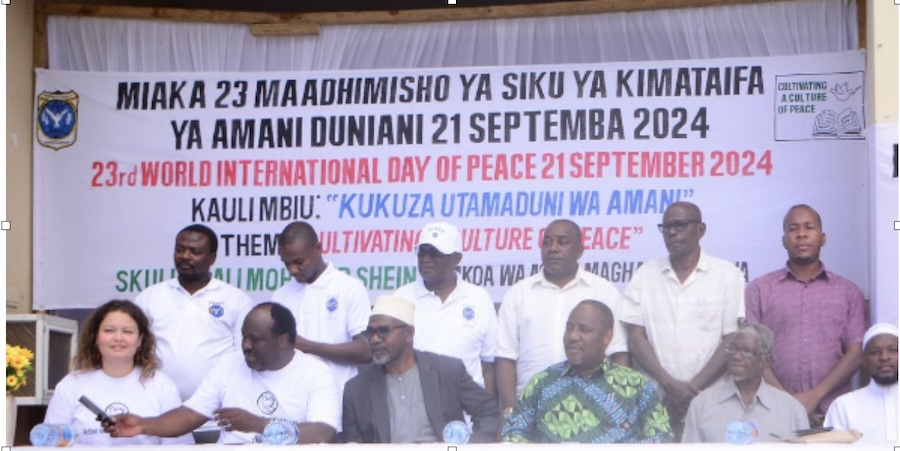
Tanzania, Zanzibar
(Survey continued from left column)
Kisumu County residents and leaders gathered at the Jaramogi Oginga Odinga Sports Complex to commemorate the International Day of Peace, highlighting the importance of fostering a culture of peace for development. . . The event, organised by the National Cohesion and Integration Commission (NCIC), brought together representatives from both national and county governments, as well as NGOs such as TINADA Organisation, Social Justice Centre Working for Peace, Lead Initiative Kenya, Act, Kenya Female Advisory Organisation (KEFEADO), Pambazuko la Wanawake Magharibi, Kisumu Progressive Youth, Nyalenda Young Turks, and The Free Pentecostal Fellowship in Kenya (FPFK) church, among others. Participants held a peace march from Kondele to the venue, planted tree seedlings, and engaged in mock sports activities to symbolise unity and mutual coexistence.
Video of celebration of International Day of Peace dedicated to restoring peace across the region.
KENYA, NAIROBI: An invitation to all Sudanese men and women in Nairobi to celebrate the International Day of Peace, with our wishes to stop the war in Sudan and silence the ugly sound of the gun forever. A symposium and concert performed by voices calling for peace, peace artists Muhammad Adam Wad Abouh and Al-Abnoosa Fadwa
Preparations for this year’s International Day of Peace, set for September 21st, are in top gear at the Lokiriama Peace Monument, where Turkana County will host the commemorative event. . . The Deputy County Secretary in charge of Cabinet Affairs, Dr Albert Gamoe, outlined that this year’s celebrations will feature a peace-themed football tournament with eight teams, a night vigil at the monument, a cross-border peace dialogue, traditional dances, artistic performances, and speeches from leaders.
“Our goal is to foster an environment where local communities can strengthen peacebuilding efforts through meaningful dialogue and networking, while receiving messages on the importance of maintaining peaceful coexistence,” . . “We expect our Ateker communities from Kenya, Uganda, South Sudan, Ethiopia and Pokots to join us for the celebrations on the 21st, after which we will proceed to Lodwar for the grand Tobong’ulore festival,” he concluded.
The International Day of Peace 2024 was marked with celebrations in Diif, Wajir county, under the theme “Cultivating a Peaceful Culture.” The event was attended by Wajir South MP Mohamed Adow, Nominated MP Sulekha Harun, Garissa Women Representative Udgoon Siyad, and representatives from the Deris Wanaag umbrella, led by the Agency for Peace and Development (APiD). Security officials and peace leaders were also present during the event on September 21, emphasizing the collaborative effort required to maintain stability in the border town, which lies at the frontier of Kenya and Somalia.
The President of the Republic of Liberia, His Excellency Joseph Nyuma Boakai, Sr., has by proclamation declared Saturday, September 21, 2024 as International Day of Peace to be observed throughout the Republic as a Working Holiday. . . The proclamation urges all citizens, government ministries, autonomous agencies, civil society organizations and private businesses, schools and colleges, places of worship, individuals within the borders to join the New African Research and Development Agency (NARDA) to plan and implement appropriate programs befitting the occasion.
The Foundation for International Dignity (FIND) on September 21 joined the rest of the world to celebrate the International Day of Peace in David Dean Town, Kokoyah District#1, Bong County. . . The nongovernmental organization’s Executive Director, Mr. JuaKollie, said, “Today, FIND and its partners joined the rest of the world in recognition of the International Day of Peace through a grand parade and indoor program spreading messages of peace, and this day is being celebrated under the global theme: “Cultivating a culture of peace.” Grace Tulay, an 8th-grade student of the Tutu Memorial Preparatory School in David Dean Town, read the United Nations Secretary-General Antonio Gutierres International Day of Peace message.
The Civil Peace Service Liberia (CPSL) recently marked the International Day of Peace with a vibrant and inspiring event in Monrovia. This year’s global theme, *“Cultivating the Culture of Peace,”* was locally adapted by CPSL under the subtheme, “Promoting a Society Free of Drugs and Substance Abuse through Effective Partnerships.”
On the International Day of Peace, the President of the Republic of Mauritius, Prithivirajsing Roopun, launched the booklet titled “Inter-Religious Dialogue within different religions” , at the State House, Réduit. This booklet highlights the importance of inter-religious dialogue to promote peace and respect in the multicultural society. The ceremony was attended by representatives of the Council of Religions, including Father Phillipe Goupille, Allia Syed Hossen-Gooljar and other personalities.
Today, on the International Day of Peace , we celebrate the tireless efforts of the Wiwanana Foundation in the conflict-affected areas of Cabo Delgado Province . Working in communities such as Soco and on the islands of Sito and Namau in the Metuge District , the Foundation has promoted the establishment of Peace Committees . These committees serve as a powerful social tool, bringing together community members to identify, discuss and prevent conflicts. Through dialogue and cooperation, Peace Committees help build collective and sustainable solutions to the challenges communities face, creating a safer and more harmonious environment.
9th edition of the celebration of the International Day of Peace by the High Authority for the Consolidation of Peace (HACP) with the theme to promote a culture of peace. General Stadium, Saturday 21 September (video of the celbration).
The Nigeria Security and Civil Defence Corps (NSCDC), Federal Capital Territory (FCT) Command, has joined the rest of the world to mark the International Day of Peace. Speaking during a symposium, which is part of the activities to mark the day, with the theme “Cultivating a Culture of Peace,” the FCT Commandant Olusola Odumosu said “Peace is not merely the absence of war; it is a way of life. It is a conscious choice to resolve conflict through dialogue, empathy and understanding.” . . The one-week long event began on Monday, 23rd September 2024 with Peace Walk from the Command Headquarters at Wuse, Zone 5, Abuja has activities lined up which include a symposium, media parley, peace seminars in secondary schools in the six (6) Area Councils of the FCT.
The International Organization of La Francophonie (OIF) has marked this year’s International Day of Peace in Abuja with the call on the international community to embrace peace. Speaking at the event, the representative of OIF, Madame Tran Thi Hoang Mai, said every human irrespective of colour and beliefs must embrace peace and make the world a better place to live. . . The host of the event, Dr Dele Babade, in his remarks, said the world need the tripod stand of peace, love, and unity which he described are essential in building blocks of a strong community.
The Commandant of the Nigerian Security and Civil Defence Corps, NSCDC, Kaduna State Command, Nuhu Muhammadu has advised residents of Kaduna State to live in peace with one another. The Commandant made the call during the commemoration of International Day of Peace with the theme, ‘Cultivating the Culture of Peace,’ held at the Kaduna State University on Saturday.
The Senegal Chapter of World Beyond War organized a special webinar on the theme “Promoting a culture of peace through youth” . . that explored innovative strategies to engage youth in peacebuilding, the importance of youth leadership in conflict prevention, and how to transform global challenges into local opportunities for peace.September 21 was also the first anniversary of the chapter, as it was launched last year during the International Day of Peace in Ziguinchor on September 21, 2023.
Video of Montessori school children in Hatfield singing for peace in coordination with Montessori schools around the world.
The cultural diversity of South Sudan was on show through the vibrant and energetic performances of multiple ethnic groups at an International Peace Day event in Juba . . Nineteen-year-old performer, Everlyne Batista, described her participation as an opportunity to put the trauma of conflict behind her and embrace feelings of unity and hope.
“With peace, I can go to school, I can live without the stress I had before, including losing my relatives. . . Politics dominated discussions among the country’s leaders, civil society, and international peace partners at the event, particularly the extension of the transitional period of the government and postponement of elections for further two years. . . Acting Minister of Peacebuilding, Losuba Wongo, acknowledged the collective responsibility for peace.
“Every individual has a role to play in nurturing peace in our communities and our hearts. Every act of kindness, every effort to understand each other and every dialogue brings us closer to lasting peace,” he said. “We have endured too much hardship, displacement and loss of life, yet amongst those challenges, we have demonstrated incredible strength and unity. Peace is not merely a dream; it can be achieved together”
Vice President Dr Philip Mpango is expected to lead over 2,000 participants, including diplomats and religious leaders, in a major symposium marking the International Day of Peace. The event, organized by the Chairman of the Religious Committee on Peace and Reconciliation, will be held at Karimjee grounds in Dar es Salaam.
Zanzibar Community in the Transition towards a Culture of Peace in the XXI Century (see photo above and article here.)
The coordinator of the Togo chapter of World Beyond War organised two activities, on the culture of peace and the mobilisation of members for the good functioning of the chapter. The first activity At the second meeting, the children committed themselves to peace, dialogue and non-violence and reflected on what they can do to spread peace. At the second, the members discussed the theme “PEACE IN ITSELF! NO TO WAR!”. On the same occasion, the chapter held its general assembly.
This year’s International Day of Peace will be marked by a major event: the Pan-African Conference for Peace and Security (COPPS), which will be held on 21 September in the Togolese capital. Entitled “Peace in Africa: Myths or Reality?”, this conference aims to examine in depth the challenges and opportunities for establishing sustainable peace on the African continent. Organised by the international NGO Mouvement des Jeunes pour la Promotion de la Paix (MJPP) and supported by the Ministry of Territorial Administration, Decentralisation and Customary Chieftaincy of Togo, the COPPS will bring together political leaders, security experts, representatives of civil society, as well as young people and women. All these actors, committed to a more peaceful Africa, will discuss ways to strengthen the capacities of local communities to face crises and security threats.
UGANDA, KAMPALA: Salamedia Center and I Am Peace Campaign cordially invite you to attend the International Day of Peace event to be held at Salamedia Center – Kampala, on Saturday, September 21, 2024. The evening will include a dialogue seminar to talk about peace, and a singing performance to support peace. The event will be accompanied by an exhibition of paintings by the visual artist Nasreddin Al-Doma, celebrating peace and diversity in Sudan.
